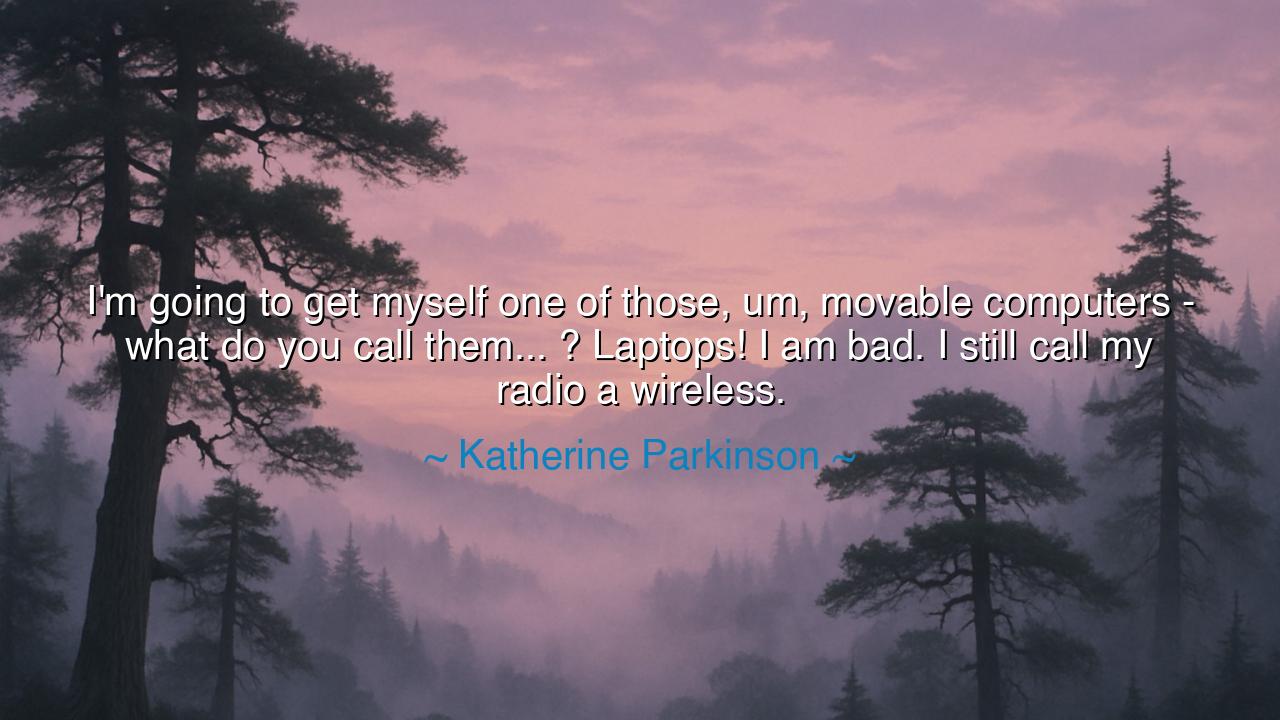
I'm going to get myself one of those, um, movable computers -
I'm going to get myself one of those, um, movable computers - what do you call them... ? Laptops! I am bad. I still call my radio a wireless.






In an age where the world shifts faster than memory can hold, the brilliant actress and wit Katherine Parkinson once confessed with gentle humor: “I'm going to get myself one of those, um, movable computers—what do you call them...? Laptops! I am bad. I still call my radio a wireless.” At first, her words shimmer with simplicity, a comic reflection on technology and time. Yet beneath their laughter lies a deeper truth — a meditation on change, nostalgia, and the unending dance between the old and the new. For in that small moment of self-deprecating wit, Parkinson reveals a universal struggle: how the human heart tries to keep pace with a world that never stops inventing itself.
The origin of this quote lies in Parkinson’s own world — one where art and technology meet. Known for her role in The IT Crowd, a comedy born from the chaos of computers and human confusion, she has long embodied the voice of those caught between eras. When she speaks of her “movable computer” and her “wireless,” she is not merely joking about age or ignorance; she is celebrating the innocence of human bewilderment in the face of progress. Her humor, gentle and self-aware, captures the timeless tension between modernization and memory, between the swift innovation of the mind and the slower evolution of the soul.
The ancients would have recognized this tension well, though their inventions were made of bronze and parchment rather than silicon and glass. When the philosopher Socrates first heard of writing — a wondrous new technology of his time — he feared it would weaken human memory. He warned that the mind, accustomed to storing wisdom within, might grow lazy if allowed to depend on symbols without. Yet even he, the lover of dialogue, could not halt the march of invention. Like Parkinson’s radio turned “wireless,” his spoken word became text, and that text became eternal. Thus, what feels strange or foreign in one age becomes sacred in the next. The laughter in Parkinson’s line carries this same timeless recognition: that every generation stands, wide-eyed and stumbling, before the miracle of the new.
And yet, her joke also carries warmth — a quiet love for what came before. When she says she still calls her radio a “wireless,” she honors the language of her forebears, the voices that shaped her world before it became digital. The word “wireless” itself, once modern and marvelous, now feels quaint, almost poetic — a relic of an age when technology still had wonder in its name. Parkinson’s humor, then, is not mockery of the past, but reverence for it. It is the smile of someone who understands that to hold on to old words is to hold on to old ways of feeling — and that memory, like language, gives meaning to progress.
History tells us that even the most brilliant minds have faced the same uncertainty before the new. When Johannes Gutenberg unveiled the printing press, the world trembled at the power of mass communication. Scribes feared extinction, priests feared heresy, and yet the printed word gave rise to knowledge unbounded. In every era, humanity meets its “laptops” — its movable miracles — with awe, resistance, and wonder. Parkinson’s confession, though tender and comic, is an echo of this eternal story: the soul’s effort to remain human amid the machinery of change.
But beneath the humor lies a deeper wisdom still — one about humility. In admitting she is “bad” at keeping up, Parkinson teaches us that it is no sin to be outpaced by progress, so long as we remain curious. The danger lies not in ignorance, but in indifference. Her laughter becomes a lesson in grace — a reminder that we need not master every device to belong in this age, but only keep the spirit willing to learn. To call a radio a “wireless” is not failure, but continuity; it is to bridge the past and the future with kindness instead of fear.
Therefore, O listener, let this jest become your teaching. When the world rushes forward, do not curse the speed — nor despise your own slowness. Remember that the heart, unlike the machine, learns in rhythm, not in code. Cherish the words and wonders of the past, even as you open your hands to the future. Laugh, as Parkinson does, at the gap between what you know and what you must learn — for laughter itself is the bridge between eras. And know this: a soul that can still laugh at its confusion has already mastered what matters most.
So let us honor her wisdom with gratitude. “I’m going to get myself one of those... laptops!” she says, half in jest, half in awe — and in that moment, she becomes every human being who ever stood before the strange and the new. Her words remind us that progress without memory is hollow, but memory without progress is stillness. Walk, then, between the two: with reverence for what was, and curiosity for what is to come. For the truest wisdom — ancient or modern — is not found in knowing every invention, but in keeping one’s wonder alive.






AAdministratorAdministrator
Welcome, honored guests. Please leave a comment, we will respond soon